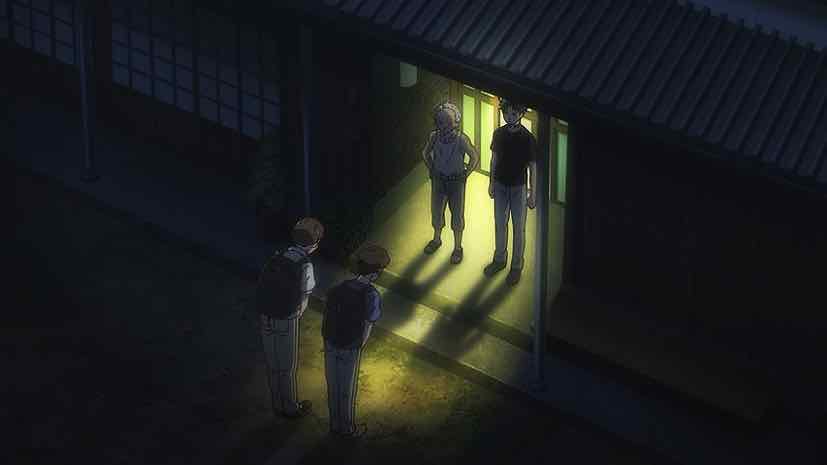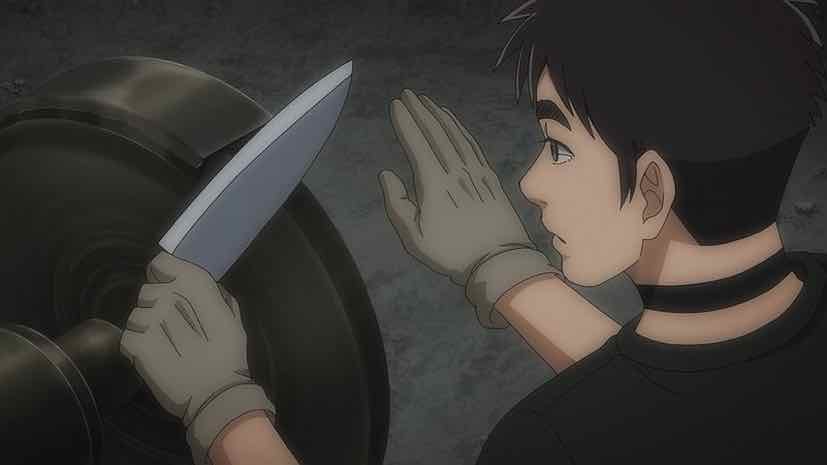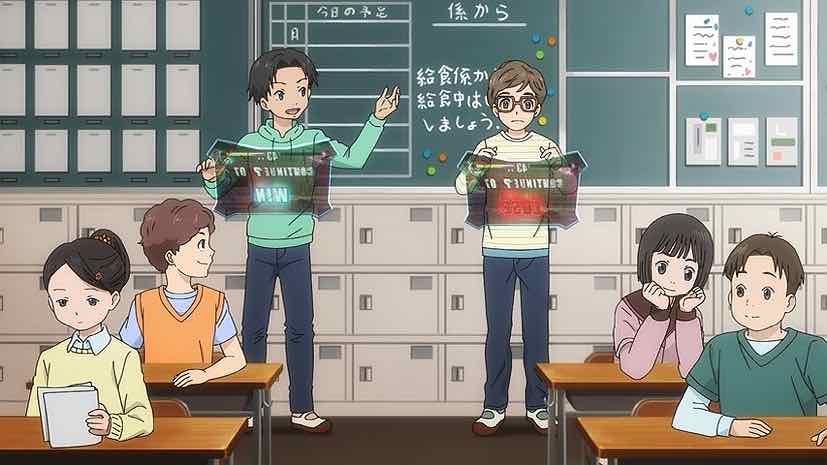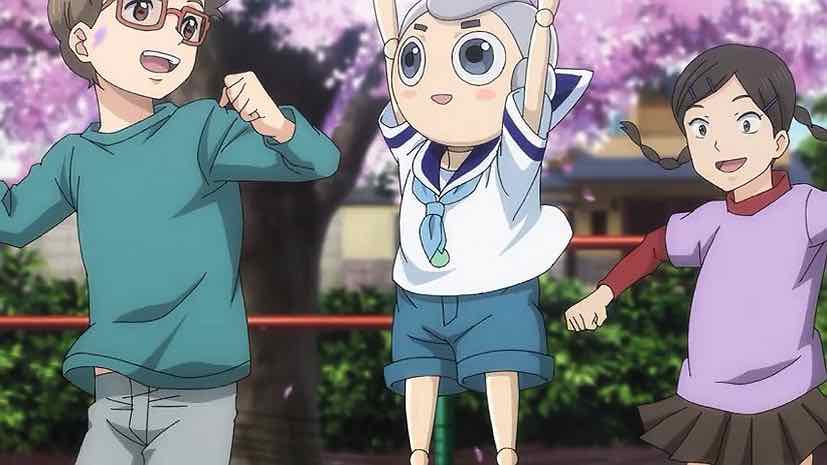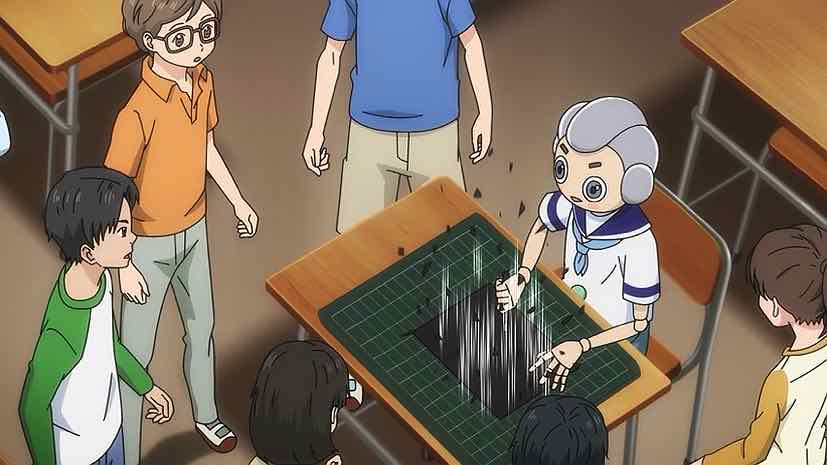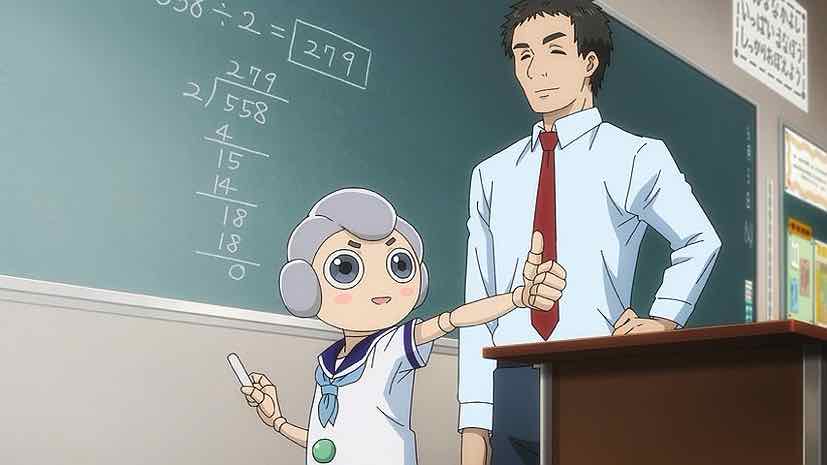 I feel a lot of admiration for AI no Idenshi after an episode like that one. I already did, but in some sense it’s much easier to go after an audience doing what it did last week, offering traditional stories with obvious conflicts. They were fascinating and troubling (especially Yuta’s story), but this – this was something altogether different. This was just a low-key presentation of one possible future, and it could be argued that it highlighted a mundane aspect of the premise. It requires a lot of faith in the audience to do that.
I feel a lot of admiration for AI no Idenshi after an episode like that one. I already did, but in some sense it’s much easier to go after an audience doing what it did last week, offering traditional stories with obvious conflicts. They were fascinating and troubling (especially Yuta’s story), but this – this was something altogether different. This was just a low-key presentation of one possible future, and it could be argued that it highlighted a mundane aspect of the premise. It requires a lot of faith in the audience to do that.
 A lot of seasons have that “tortoise and the hare” series, and AI no Idenshi certainly fills the bill for summer. It makes you both think and feel without knocking you over the head about it. And I think the robot-themed stories (like this week’s) have been just as effective as the humanoid ones. First off is “Learner-kun“, a robot in the service of an anthropology (I assume) professor. His function is to record the traditional arts and crafts – in this case metalsmithing – in danger of dying out along with the aging practitioners. To that end the professor has his robot go to work for the reluctant Kitayama-san, an old knife and tool maker in the mountains who’s very skeptical of the whole process.
A lot of seasons have that “tortoise and the hare” series, and AI no Idenshi certainly fills the bill for summer. It makes you both think and feel without knocking you over the head about it. And I think the robot-themed stories (like this week’s) have been just as effective as the humanoid ones. First off is “Learner-kun“, a robot in the service of an anthropology (I assume) professor. His function is to record the traditional arts and crafts – in this case metalsmithing – in danger of dying out along with the aging practitioners. To that end the professor has his robot go to work for the reluctant Kitayama-san, an old knife and tool maker in the mountains who’s very skeptical of the whole process.
 What makes this so interesting is that Kitayama is skeptical about more than robot apprentices. He doubts his trade is worth passing along at all – none of his human apprentices stuck with it, and he reasons that mass-produced knives and scythes are better than what most of his guild can make by hand. But Learner is an apt student, and in fact winds up producing better products than the master himself. Rather than be depressed this seems to inspire Kitayama, which may be a idealised result but certainly an encouraging one.
What makes this so interesting is that Kitayama is skeptical about more than robot apprentices. He doubts his trade is worth passing along at all – none of his human apprentices stuck with it, and he reasons that mass-produced knives and scythes are better than what most of his guild can make by hand. But Learner is an apt student, and in fact winds up producing better products than the master himself. Rather than be depressed this seems to inspire Kitayama, which may be a idealised result but certainly an encouraging one.
 There’s certainly a real-world application for this idea – not just with traditional crafts (which often survive now only as literal museum pieces) but dying languages too. Are robots so different than early recording devices used to chronicle blues singers and the last speakers of regional dialects or tribal languages? It seems like a truly worthy use of artificial intelligence to me, albeit one without any direct financial incentive (which could make it a tough sell when it comes to paying for it).
There’s certainly a real-world application for this idea – not just with traditional crafts (which often survive now only as literal museum pieces) but dying languages too. Are robots so different than early recording devices used to chronicle blues singers and the last speakers of regional dialects or tribal languages? It seems like a truly worthy use of artificial intelligence to me, albeit one without any direct financial incentive (which could make it a tough sell when it comes to paying for it).
 Next up is Perm-kun, a robot assigned to join a fourth-grade class. The idea is that Perm is a caregiver robot, and what he’ll learn with the kids will help him more ably perform that role. That connection is harder to draw, but it’s fascinating watching the robot child interact with the human ones. They take a friendly attitude towards Perm-kun from the start (again, perhaps idealized), a willing learner. He struggles with simple tasks but can do incredible things, and learns faster than any human child could. In time he becomes “friends” with the human children – or at least claims to, and it’s hard to imagine they’d see it differently.
Next up is Perm-kun, a robot assigned to join a fourth-grade class. The idea is that Perm is a caregiver robot, and what he’ll learn with the kids will help him more ably perform that role. That connection is harder to draw, but it’s fascinating watching the robot child interact with the human ones. They take a friendly attitude towards Perm-kun from the start (again, perhaps idealized), a willing learner. He struggles with simple tasks but can do incredible things, and learns faster than any human child could. In time he becomes “friends” with the human children – or at least claims to, and it’s hard to imagine they’d see it differently.
 What’s really interesting here is that Perm very clearly demonstrates empathy in dealing with the kids. On some level I suppose that was the point, but is it really possible for what’s deemed a tool – this is not a humanoid – to feel empathy? Or is Perm just that good an actor? It’s implied that Perm is part of a larger network of Perms, seeded among different age groups and networking their learning, and the unsettling fear he develops of box cutters implies that this might be true. But what was Perm supposed to get out this experience, in the end – and what were his human classmates supposed to (does that even matter)?
What’s really interesting here is that Perm very clearly demonstrates empathy in dealing with the kids. On some level I suppose that was the point, but is it really possible for what’s deemed a tool – this is not a humanoid – to feel empathy? Or is Perm just that good an actor? It’s implied that Perm is part of a larger network of Perms, seeded among different age groups and networking their learning, and the unsettling fear he develops of box cutters implies that this might be true. But what was Perm supposed to get out this experience, in the end – and what were his human classmates supposed to (does that even matter)?
 Again, I don’t think AI no Idenshi is so much interested in supplying the answers is it is in prompting us to consider the questions for ourselves. Which is a pretty noble way to go about storytelling, it seems to me. Taking the more difficult path in the ways it does is rarely a ticket to commercial success, but there are other forms of success in artistic endeavors that matter more. It’s a series that demands you be OK with being challenged a little but if you are, I think the rewards are considerable.
Again, I don’t think AI no Idenshi is so much interested in supplying the answers is it is in prompting us to consider the questions for ourselves. Which is a pretty noble way to go about storytelling, it seems to me. Taking the more difficult path in the ways it does is rarely a ticket to commercial success, but there are other forms of success in artistic endeavors that matter more. It’s a series that demands you be OK with being challenged a little but if you are, I think the rewards are considerable.







